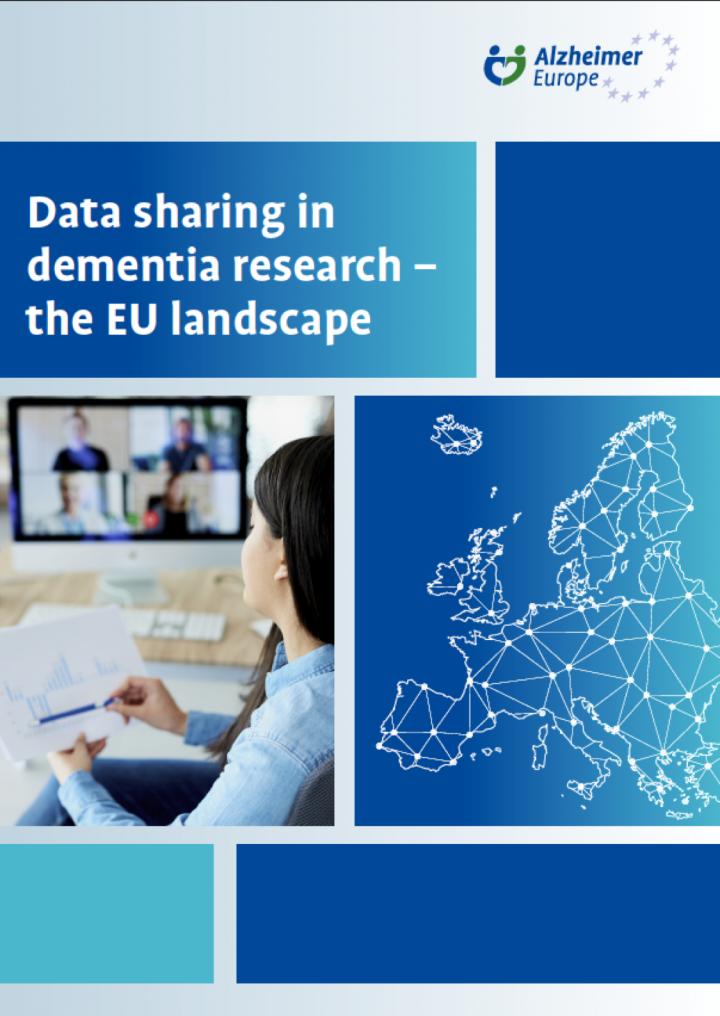
Credit: Alzheimer Europe
Luxembourg, 23 February 2021 – At an online European Parliament workshop hosted by Deirdre Clune MEP (Ireland), Alzheimer Europe launched a new report “Data Sharing in Dementia Research”, which reviews recent changes in EU research policy and sets out recommendations to improve data sharing in dementia research.
In this report, Alzheimer Europe evaluates the legal and policy landscapes that dementia researchers have had to navigate since the launch of Horizon 2020 in 2013. The report identifies key barriers and enablers for data sharing. It maps the Horizon 2020 dementia research portfolio, assessing the scale of EU investment in dementia research and the use of clinical research data. Finally, it reviews recent surveys of researchers, research participants and patients, collating their perceptions and concerns regarding data sharing.
Key findings:
- To date, over EUR 570 million has been invested through Horizon 2020 in dementia research projects, many of which involve the use of clinical data
- Although Open Access principles have been widely adopted, the uptake of Open Data practices varies between sectors and Member States
- The General Data Protection Regulation (GDPR) has not yet fully delivered on its aim of facilitating research data sharing, due to a perceived lack of clarity and regulatory divergence between Member States
- Researchers face technical, financial and motivational obstacles to data sharing, with the loss of privacy being the most frequently-cited concern for research participants.
Key recommendations to improve data sharing:
- Developing pathways for faster, secure sharing of research data between sectors and across borders, including GDPR codes of conduct and standard contract clauses
- Supporting researchers to maintain datasets and platforms after projects end, and embedding academic reward systems that place a greater value on data sharing and transparency
- Increasing digital literacy in the general population, ensuring that older adults and vulnerable groups are not left behind
- Involving people with dementia in the design and conduct of research, as well as in data governance.
Commenting on the launch of the report, Alzheimer Europe’s Executive Director, Jean Georges, stated:
“The number of people with dementia in Europe is likely to double by 2050, increasing from 9.78 to 18.8 million in the wider European region. Unfortunately, research on dementia has historically received proportionately less funding than other disease areas. As a result, there is an urgent need to maximise the utility of data from dementia research. Data sharing represents an important step towards meeting this need, and could help increase our understanding of the causes, treatment, prevention and care of dementia. However, there is still much to do to improve data sharing in dementia research. To ensure people with dementia benefit from the progress made in recent years, we need to work together to overcome the remaining obstacles to data sharing, and maintain dementia research as a priority for EU research programmes.”
###
To download (PDF):
https://bit.ly/AE_Data_Sharing
For further information, contact:
Jean Georges,
Executive Director, Alzheimer Europe,
14, rue Dicks, L-1417 Luxembourg,
Tel.: +352-29 79 70,
Fax: +352-29 79 72,
[email protected],
http://www.
Alzheimer Europe gratefully acknowledges the support of GatesVentures for its report on “Data sharing in dementia research – the EU landscape”.
Notes to editors:
Alzheimer Europe is the umbrella organisation of national Alzheimer associations and currently has 39 member organisations in 35 European countries. The mission statement of the organisation is to change perceptions, practice and policy to ensure equal access of people with dementia to a high level of care services and treatment options.
To support people with dementia, carers and Alzheimer’s associations during the COVID-19 pandemic, the organisation has dedicated a special section of its website to useful resources and links:
https:/
Media Contact
Kate Boor Ellis
[email protected]




